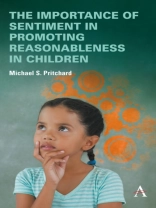On Becoming Reasonable explores the contributions that 18th Century Scottish philosophers Thomas Reid, Adam Smith, and David Hume make to our understanding of important factors in the development of children as they gradually acquire central features of reasonableness. Smith and Reid explicitly discuss the importance of sentiment and reason in the development of children. Their views are favorably influenced by the writings of their English predecessor Joseph Butler. Hume, too, valued much of Butler’s thinking. But, unlike Smith and Reid, he said little about Butler’s specific reflections on sentiment and reason. Despite this, one of the aims of this little book is to show that each contributes to our understanding today of what the encouragement of the philosophical thinking of children can play in helping them to come to an appreciation of reasonableness. Although his earlier book, Reasonable Children (University Press of Kansas, 1996), made some use of Thomas Reid’s writings on practical ethics, He had yet to become acquainted with Adam Smith’s Theory of Moral Sentiments (TMS), whose several editions were composed at the same time he was writing his more celebrated Wealth of Nations. Reading TMS has led him in this book to compare and contrast Smith’s views with those of his good friend David Hume and Hume’s notable critic, Reid. These further reflections have resulted in a revisiting of several major concerns of Reasonable Children.
His special focus is on their views about the moral development of children. He regards each of the three, in their differing but sometimes complementary ways, as welcoming the sorts of refinements of reason and sentiments that play a fundamental role in the moral development of children. He concludes that each can be regarded as supporting the general view that the moral development of children can fairly be characterized in terms of the degree to which they are becoming reasonable persons. This, he argues, fits in well with the more recent work of philosophers such as Matthew Lipman, Ann Margaret Sharp, and Gareth Matthews who began urging in the late 20th Century that the philosophical thinking of children should be encouraged.
สารบัญ
Acknowledgments; Dedication; Preface; 1. Reasonable Children?; 2. Thomas Reid on the “Seeds of Morality”; 3. Smith’s “Impartial Spectator”; 4. Reason and Sentiment in Morality; 5. The Premise of a Promise; 6. Conversation and Critical Thinking; Concluding Thoughts ; Bibliography; Index
เกี่ยวกับผู้แต่ง
Michael S. Pritchard is Emeritus Professor of Philosophy at Western Michigan University (USA). His teaching has focused on practical and theoretical ethics, the philosophical thinking of children, and eighteenth-century Scottish philosophy.












